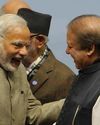Earlier India had to accommodate the Arab-Islamic opposition to normalisation of relations with Israel, but now it is the other way around.

INDIA’S RELATIONS WITH Israel can be described within four broad historical processes that date back to the early part of the 20th century. The emergence of Jewish nationalist aspirations in Palestine coincided with the impending disintegration of the already crumbling Ottoman Empire which also had the caliph. For centuries, Indian Muslims were indifferent both to the Ottoman sultan and his caliphate, but the disappearance of the Mughal empire and its replacement by the British transformed the situation. The Ottomans being the last surviving Islamic empire galvanised a sudden interest among the Indian Muslims and culminated in the Khilafat movement.
Enter Mahatma Gandhi. He sees the Muslim agitation over a pan-Islamic issue as an opportunity to forge much needed but long absent Hindu-Muslim unity and unconditionally plunges the Congress into supporting the Khilafat struggle. Though the community unity proved short-lived and counterproductive in the long run, the phase also witnessed the emergence of rudimentary Indian position vis-à-vis the Jewish claims.
Gandhi framed Palestine within the Islamic paradigm and categorically ruled out sovereignity being granted to the non-Muslim population. Though the Congress did not go that far, the matter was settled squarely. As the political tussle between the Congress and the Muslim League intensified in the 1930s, the Palestine issue became the quid pro quo for the Congress to seek support from the Indian Muslims and wean them away from the League.
There was also an ideological compulsion. Having rejected Mohammed Ali Jinnah’s arguments of religion being the basis for nationhood, the Congress could not adopt a contrary view on the Jewish nationalism. Hence, at the ideological level, it opposed the minority nationalism both in India and in Palestine.
This story is from the June 2017 edition of Swarajya Mag.
Start your 7-day Magzter GOLD free trial to access thousands of curated premium stories, and 9,000+ magazines and newspapers.
Already a subscriber ? Sign In
This story is from the June 2017 edition of Swarajya Mag.
Start your 7-day Magzter GOLD free trial to access thousands of curated premium stories, and 9,000+ magazines and newspapers.
Already a subscriber? Sign In

Refuging Progess
There is a well-orchestrated global conspiracy to deny scientific and technological developments from the West to Third World countries.

The Monk Of Science
Vivekananda believed that Religion should be subjected to scientific methods of investigation. The third and concluding part of our series on the Swami and his views on science.
The Next Step
Indian technical manpower can be trained for high-value-added emerging services in the era of mass commoditisation of hardware.
The Threat Of Autarchy
The force of globalisation is an irreversible reality, and it is countries like India and China that will nurture it going forward.

Neanderthals: The Womb Of Caves
Recent discoveries indicate that Neanderthals may have had a rich inner life, including symbolic thought. Indeed, they may have been the progenitors of human religions.

Getting India's World Right
Incremental concessions will get India nowhere with Pakistan and China. What we need is a classically conservative foreign policy, based on realism.

The Hesitant Orbit
In order to march boldly ahead into the deep space, New Delhi must work towards building a station, boost its techno-economic planning and use the Indian Space Research Organisation smartly.

Nudges And Narratives
The debate surrounding Sanjay Leela Bhansali’s Padmavati brings India a complex network of portraits within a cultural world-system.

The Spell Of Specialisation
THE INDIAN ADMINISTRATIVE SERVICE NEEDS AN URGENT REJIG. THE KEY TO SPEED AND EFFICIENCY LIES IN PUTTING AN END TO A GENERALIST APPROACH AND IN GOING FOR A NEW SERVICE.
The Great Gamble
With demonetisation, the prime minister has taken a huge risk— both economic and political. He must succeed, because this move could transform both our economy and our society.